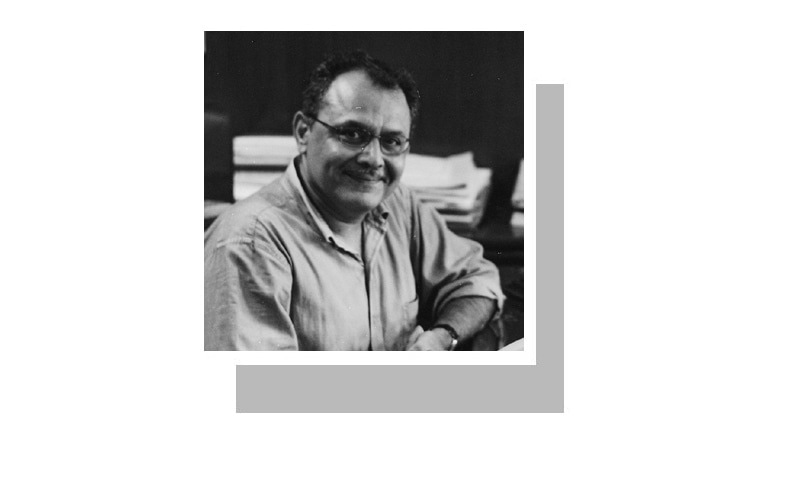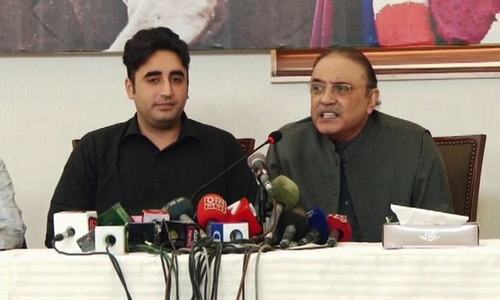THE noose around the two main opposition political parties is being tightened and it seems no effort will be spared to decapitate them within the six-month window dedicated to ‘positive’ change.
The conviction and sentencing of Nawaz Sharif via a 131-page judgement written by the accountability court judge Arshad Malik — which The News’s Waseem Abbasi pointed out relied on the word ‘presume’ 10 times and used ‘presumption’ on 13 occasions to establish the former prime minister’s guilt in an assets-beyond-means case — was a vital link in the chain.
Nawaz Sharif joined his younger brother and current PML-N president in Lahore’s Kot Lakhpat jail where the latter is being held on judicial remand while NAB, led by the inimitable retired justice Javed Iqbal, pursues charges related to corruption and misuse of office against him.
The decapitation of political parties that are seen as corrupt is taking place as key state institutions find themselves on the same page on the issue.
Then the PTI government and its powerful backers totally overshadowed the commemoration of the 11th anniversary of the murder of former prime minister Benazir Bhutto by placing the entire top leadership of the PPP on the Exit Control List (ECL), after media leaks of an inquiry report linked a multi-billion-rupee fake accounts and money-laundering operation to the party leaders.
Former president Asif Ali Zardari, PPP chairman Bilawal Bhutto-Zardari, the president’s sister Faryal Talpur, Sindh Chief Minister Syed Murad Ali Shah, former chief minister Syed Qaim Ali Shah, Bahria Town boss Malik Riaz and a host of others were cited in the case.
Gratefully for the prosecution, Pakistan does not have a system of trial by jury or this case would have collapsed before it got under way. The ‘leaks’, which obviously were taken without as much as a pinch of salt by the media, laid out seemingly damning (but one-sided) evidence in advance of any trial.
It is for the lawyers to say whether this media trial, preceding any trial in court, is permissible under Pakistani law. Equally, legal experts also need to share their thoughts more on whether these investigations by Joint Investigation Teams in which services intelligence officers are also included serve the cause of justice.
In a twist of irony that has made Pakistan its home — and on the same day DC Malir was placed on the ECL, in all probability for involvement in ‘land development’ cases — the former SSP Malir asked the court to remove his name from the ECL as he wished to proceed abroad for pilgrimage.
Apart from being cited in over 400 cases of extrajudicial murders (some among those not his own victims... he was allegedly used to dispose of the bodies of ‘terrorists’ killed by other agencies too), Rao Anwar was seen as a key enforcer for the land-grab operation of Bahria Town and was close to Asif Zardari.
Knowledgeable sources say it is these multiple services he rendered for different personalities and state institutions that have so far ensured little progress in the case of Naqibullah Mehsud’s murder in Karachi in which he has been cited. “If in the past Mr Zardari may have protected him, now the people for whom he claimed terrorist ‘kills’ are backing him,” said one source.
The decapitation of political parties that are seen as corrupt is taking place as key state institutions find themselves on the same page on the issue. Additionally, even though nobody is prepared to acknowledge it, some politicians are also being punished for their recent defiance of powerful actors on the national stage.
Of course, while this defiance was lawful and not extra-constitutional, it may have fallen under the category of imprudence, given the ground realities. Again an irony that the defiant ones are having their noses rubbed in dirt; those who overstepped their own roles are unlikely to be held to account.
The PML-N has been fairly consistent in its hard-line stance to stress its constitutional right after being elected to office to make policy and take decisions unpalatable to the so-called establishment — and hence its fate.
However, the PPP’s policy of blow hot, blow cold has not worked either. Look at how the PPP leader helped destabilise the PML-N-led Balochistan government ahead of the Senate elections. And eventually voting for the unknown Sadiq Sanjrani as chairman of the upper house because he was said to be the nominee of the establishment.
Now with its back to the wall, one hears defiant talk coming out of the leadership ranks. This seems a case of too little, too late. The naming of Bilawal Bhutto Zardari in the JIT report and the likelihood of references against him too leads one to believe that the decapitation will be followed by a PPP-Patriots-like arrangement in Sindh and the party may not be allowed to govern.
For now, the response of both the PML-N and PPP to these existential threats remains unclear. If they are unable to mobilise their supporters to the extent of a street movement, then the replay of the post-2002 elections seems on the cards.
Both parties’ elected members will be subjected to immense pressure to form forward blocs. If their parliamentary presence is denuded the PTI and its backers will have the field, stripped of any meaningful opposition, to themselves.
This, of course, would be an undermining of the democratic process and not necessarily a big win. One-party rule carries many perils inherent within it. The foremost is that lack of parliamentary opposition and accountability can lead a government astray in policy terms. History is replete with examples of what happens as a result.
Then, so many of our ups and downs are related to individuals taking over key offices. The next year will see a new chief justice and army chief in office. Their priorities may be different to the incumbents. Last but not the least, our people cherish freedom and may soon tire of a managed democracy just as they will, one can be sure, of a managed media. What then?
The writer is a former editor of Dawn.
abbas.nasir@hotmail.com
Published in Dawn, December 29th, 2018














































